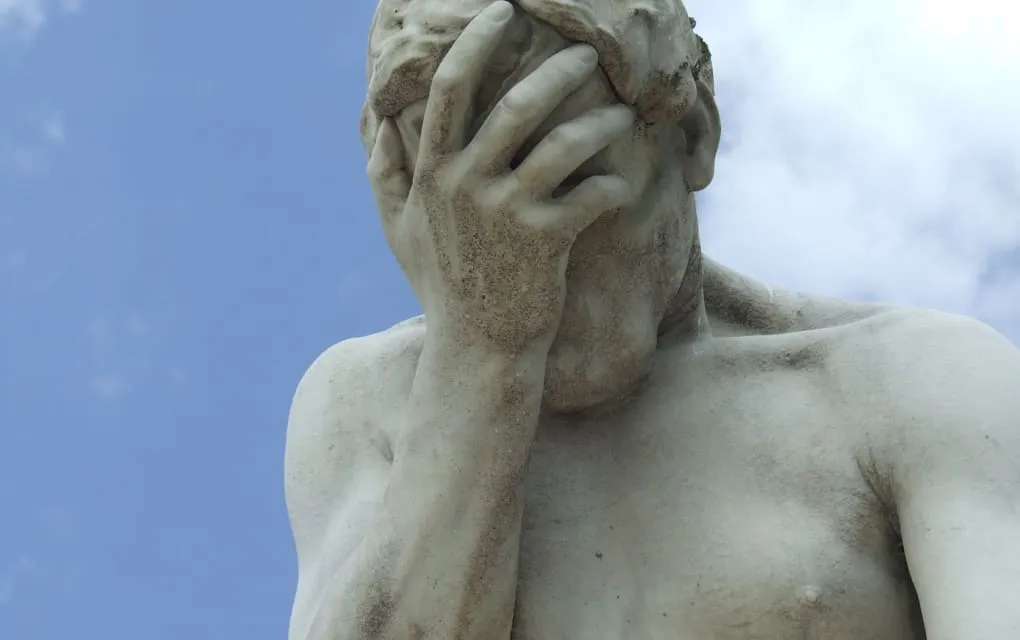It’s hard to be a climate change denier these days, but the deniers keep trying, with U.S. Sen. Mitch McConnell and the Kentucky legislature helping lead the way.
Evidence of a crisis keeps slapping us in the face, almost literally, as smoke from Canadian forest fires visits Kentucky. At our vacation getaways in Florida, ocean water temperatures are reported higher than our body temperatures, and in some cases reaching hot-tub temperatures. On July 3 this year the world broke the record for the highest average worldwide temperature since worldwide average temperatures started being recorded. On July 4 it broke that record. On July 5 it tied that record. On July 6 it broke the record again.
And those new records are not a fluke. The average world temperature has been steadily rising since 1980.
The deniers have to keep changing tactics as they try to keep us from seeing and feeling the obvious, and from listening to what essentially every scientist warns – that we’re careening into crisis caused by burning fossil fuels.
Nothing to see here
Four years ago, many of the deniers recognized that the mantra of saying there was no such thing as climate change was no longer viable. So a chorus developed contending that yes, global warming is of course happening, but it’s not so bad – we can make a few changes, a little more solar here, a little more nuclear power there, and we’re good. Nothing to see here.
But now there’s plenty to see. And feel. And smell. So McConnell trumpeted the latest version of denialism in an essay published this summer in The Courier-Journal. Environmentalists (especially Biden), he writes, are threatening your electricity. The reasoning goes that the tree huggers want to get rid of an inexpensive, reliable form of energy by replacing coal with solar that doesn’t work at night and wind that doesn’t work in calm weather.
The Kentucky legislature anticipated that argument, putting it into action this year by making it harder for utilities to close coal plants – a plan even the utilities opposed.
What’s wrong with the denier’s latest logic is pretty basic: coal is neither inexpensive nor dependable.
The truth about coal
The spotty reliability and blackouts during the past two years, that the deniers blame on renewable energy, actually happened in today’s utility system that still runs on traditional sources of fuel. Coal, natural gas, nuclear, and hydroelectric power generate 84% of the nation’s power. Solar and wind supply less than 15%.
Solar and wind even saved the day in two major power shortages in Texas. Several coal and gas plants failed during heat spikes this summer and a deep freeze a year-and-a-half ago. Texas happens to have tons of wind and solar capacity, though, enough to supply 40% of its electricity. Analysts credited those renewables with keeping the weather disasters from being much worse.
And coal can no longer be considered inexpensive. Wind and solar are now price competitive and getting cheaper all the time.
More flaws in the deniers’ new logic
Today is not tomorrow. The essence of the latest denier argument is that our electric service will collapse under the impracticalities of too much solar, wind, and electric cars. The electric grid can’t handle it, they say. That’s certainly true if all coal and natural gas were eliminated today. But that’s not going to happen even in the most rosy environmental scenario. Electric car sales and renewable energy are growing fast, but even rapid growth, since it’s starting from very low numbers, will take years to start making a significant difference. That gives utilities plenty of time to prepare for a greener electric grid, and that’s exactly what they’re doing.
Utility investment in the transmission lines that can connect new renewable energy to the rest of the electric grid has been growing steadily over the past 10 years, increasing 30% over that time. Last year’s White House infrastructure act puts additional billions of dollars into modernizing the grid.
Better batteries are coming. And something else will help the transition to clean energy: batteries. While it’s true solar and wind don’t operate all the time, batteries can. Competition for cheaper and longer-lasting batteries is fierce – we all want them for our phones and, more and more, for electric cars. Utilities are building large battery plants that can make renewable energy more useful by charging the batteries while the solar and wind are operating, then discharging them when the power is needed. Grid-scale battery capacity increased 900% in the past three years, and that fast growth will continue.
Democrats are not robbing people of their coal jobs. Electric utilities are the ones choosing to close coal plants, replacing them with power from natural gas plants that are easier to build and can be much cheaper to operate. Employment in the coal industry has been declining for decades, through Republican and Democratic administrations, as mechanization and cheaper natural gas changed the face of fuel production. If you’re looking to place blame for lost coal jobs, a more likely culprit would be the fracking and other drilling technologies that flooded the market with natural gas in the 1990s.
It’s also worth noting that two of the 20 fastest growing jobs in the United States are wind turbine service technician and solar voltaic installer.
Deny all you want – the reality is that the crisis is upon us
The fundamental problem with today’s reboot of climate-change denialism is that it requires completely ignoring global warming. In his Courier-Journal essay, Mitch McConnell didn’t offer even a single phrase acknowledging climate change. Last summer the U.S. Supreme Court restricted the Environmental Protection Agency’s ability to regulate greenhouse gas emissions, without referring even once to the effects of global warming or climate change.
For many years the deniers' preferred tactic was to point to the few scientists who cherry-picked research to minimize the effects of climate change. But now that people can feel the effects in their lungs and see whole communities destroyed by flooding, the deniers’ tactic is to act like global warming doesn’t exist. Instead, they hope to scare and distract people with phony baloney hype about blackouts and higher rates.
Yes, environmental actions have played a part in putting pressure on coal plants. But even the deniers don’t advocate a return to smog-choked cities of the 1960s. A healthier planet is a worthy goal, and over the decades rules and regulations to protect the environment have been put into place by both political parties. Richard Nixon signed the Clean Air Act into law, created the Environmental Protection Agency, and imposed a 55-mph speed limit (no, not Jimmy Carter.) As for the decline in coal industry jobs, the steady, annual downward trend happened on Mitch McConnell’s watch, starting about 40 years ago when he first got elected to the Senate.
As the world heats up, the logic for denying climate change is going up in smoke.
--30--







